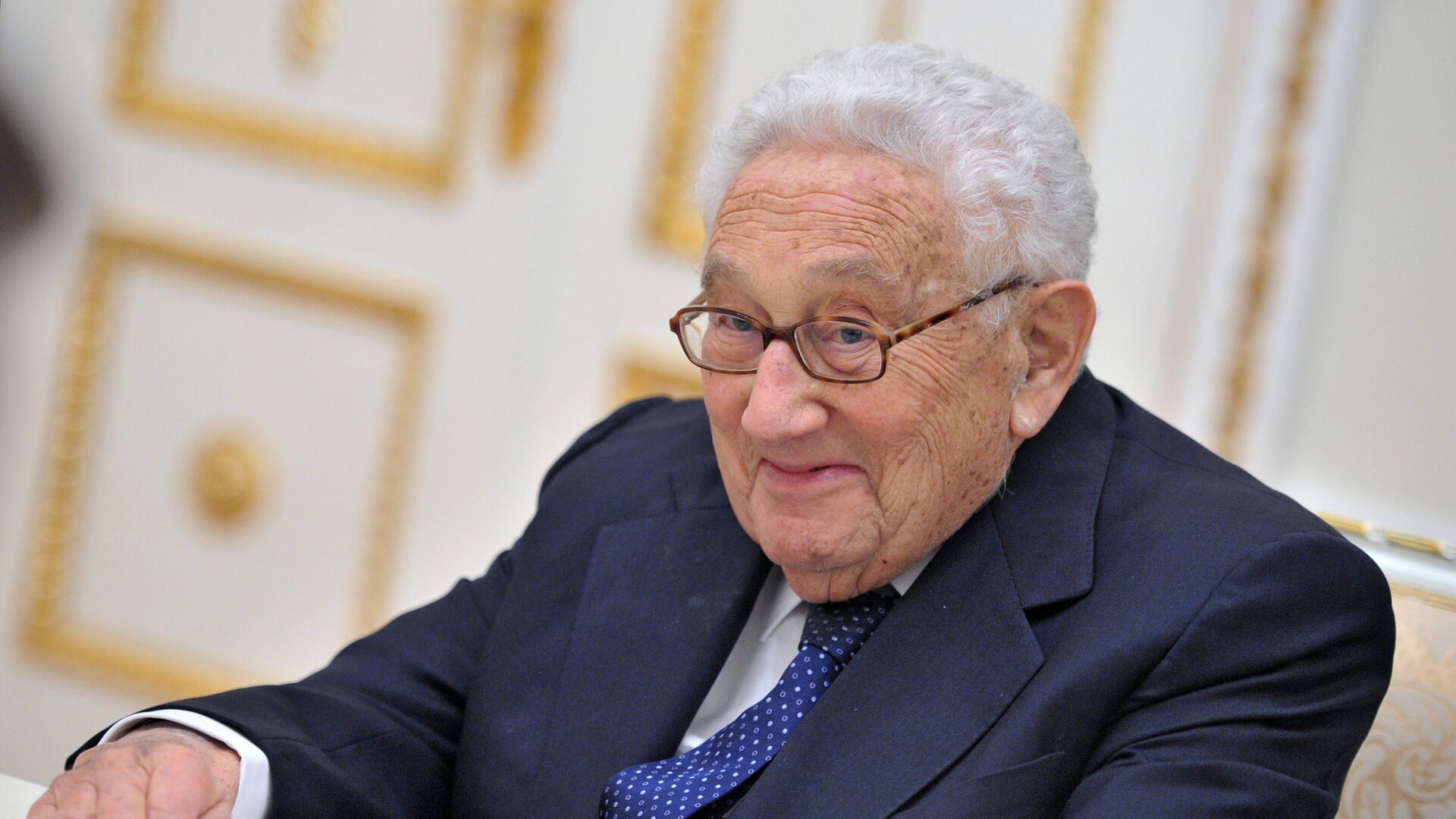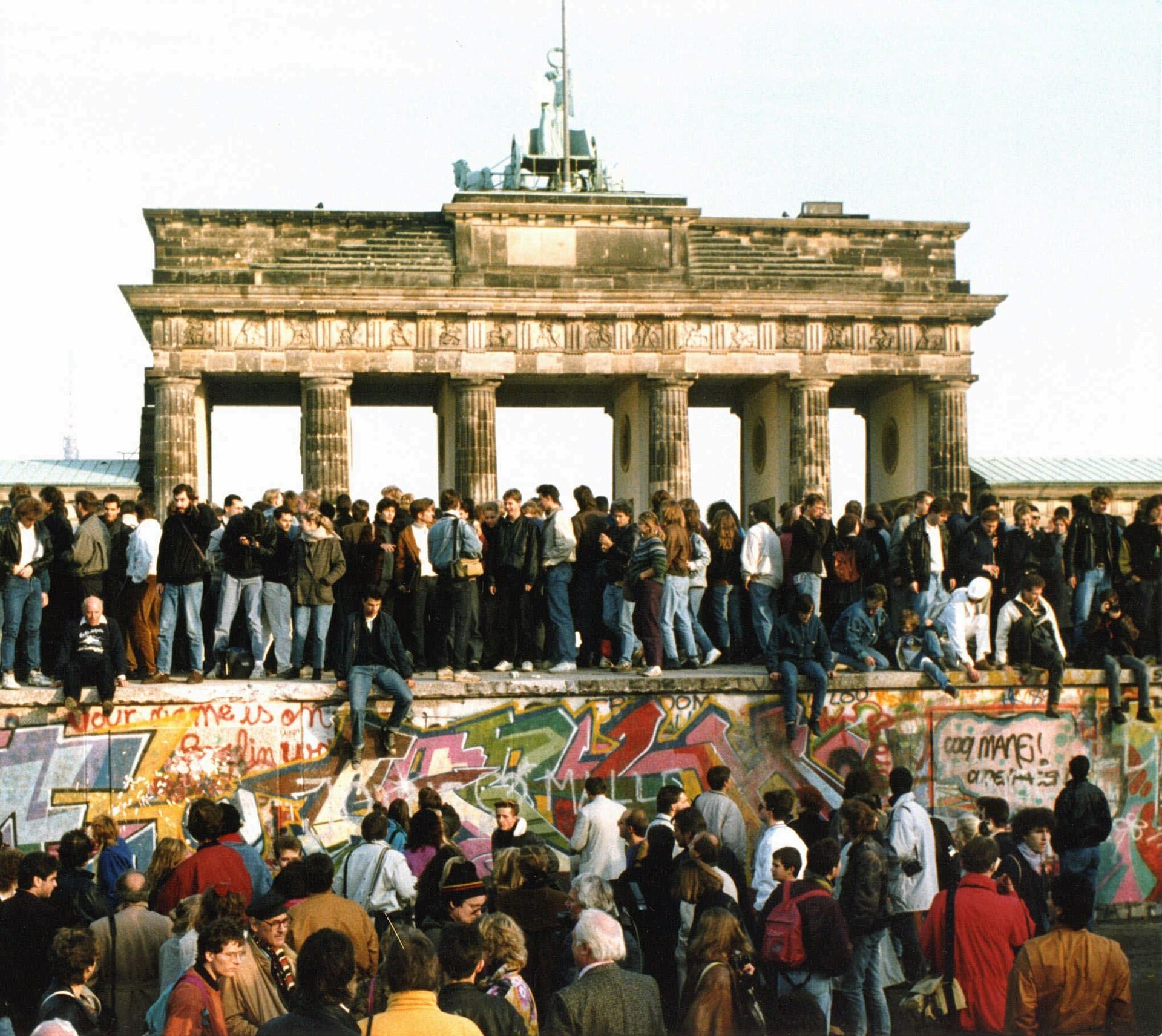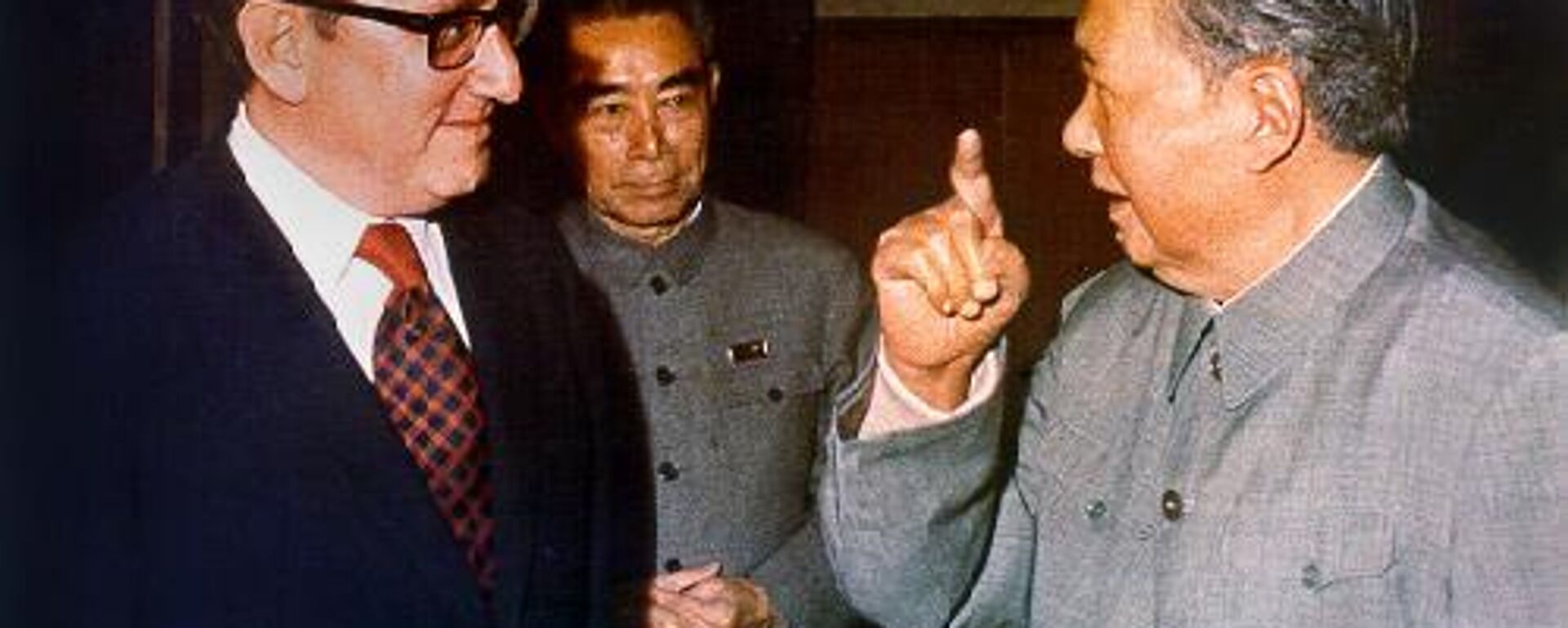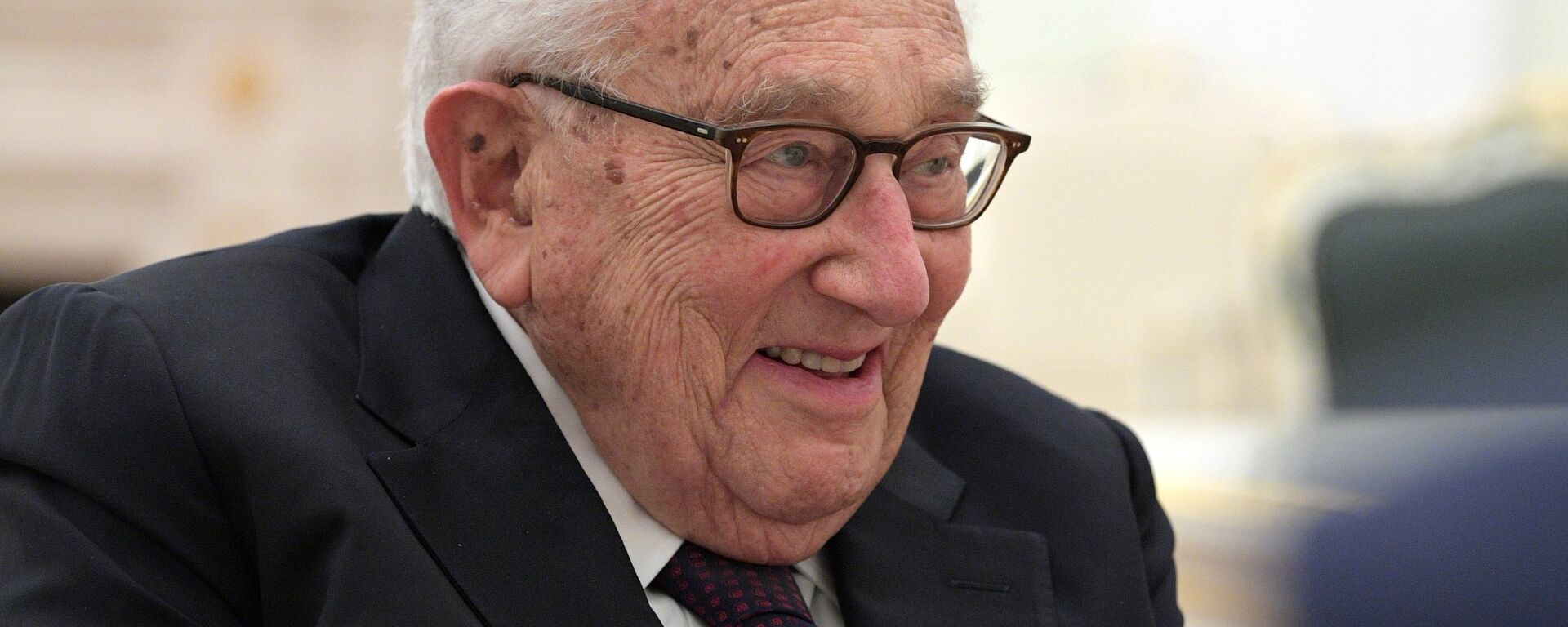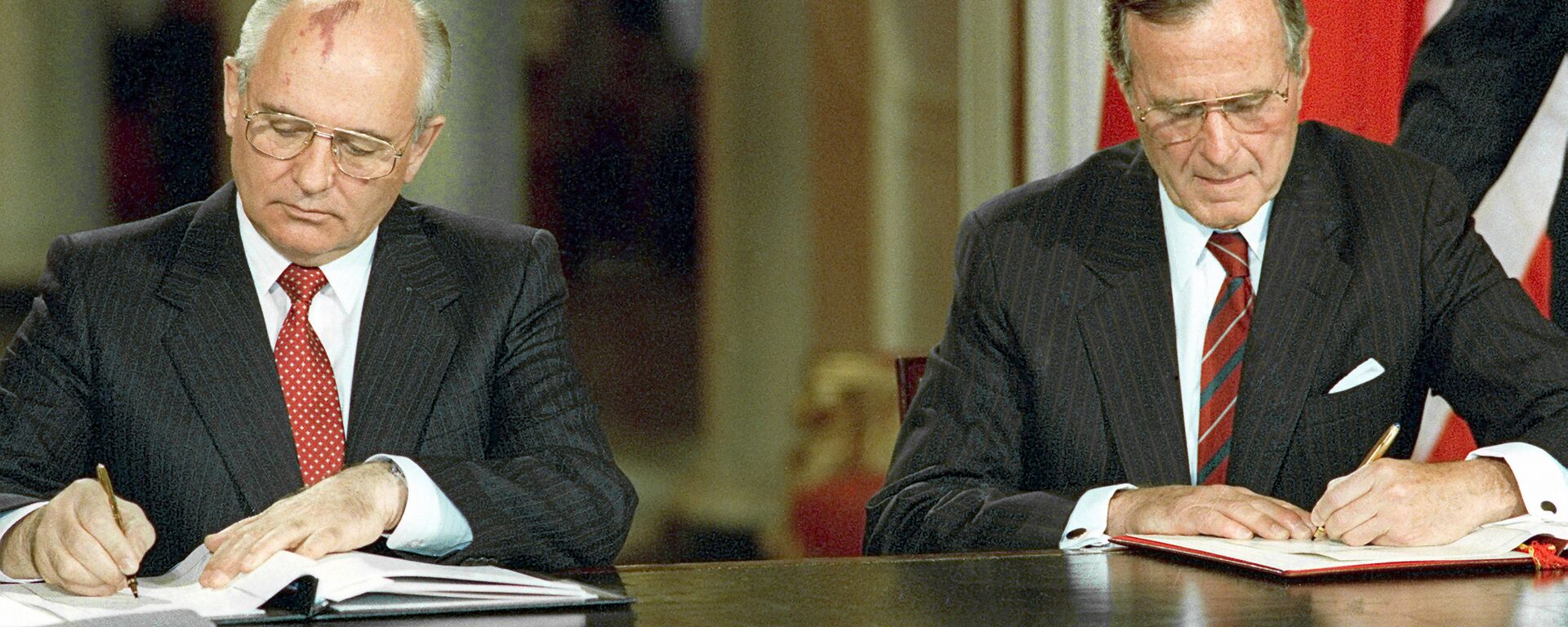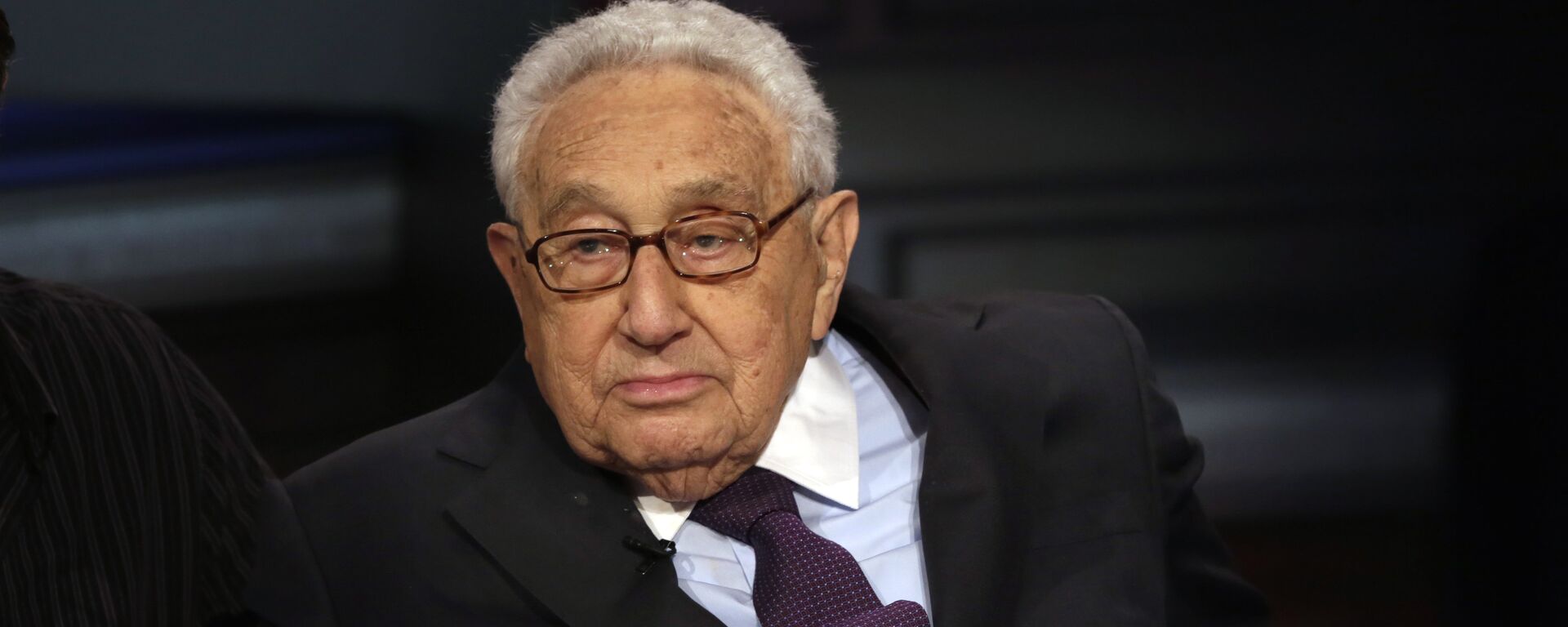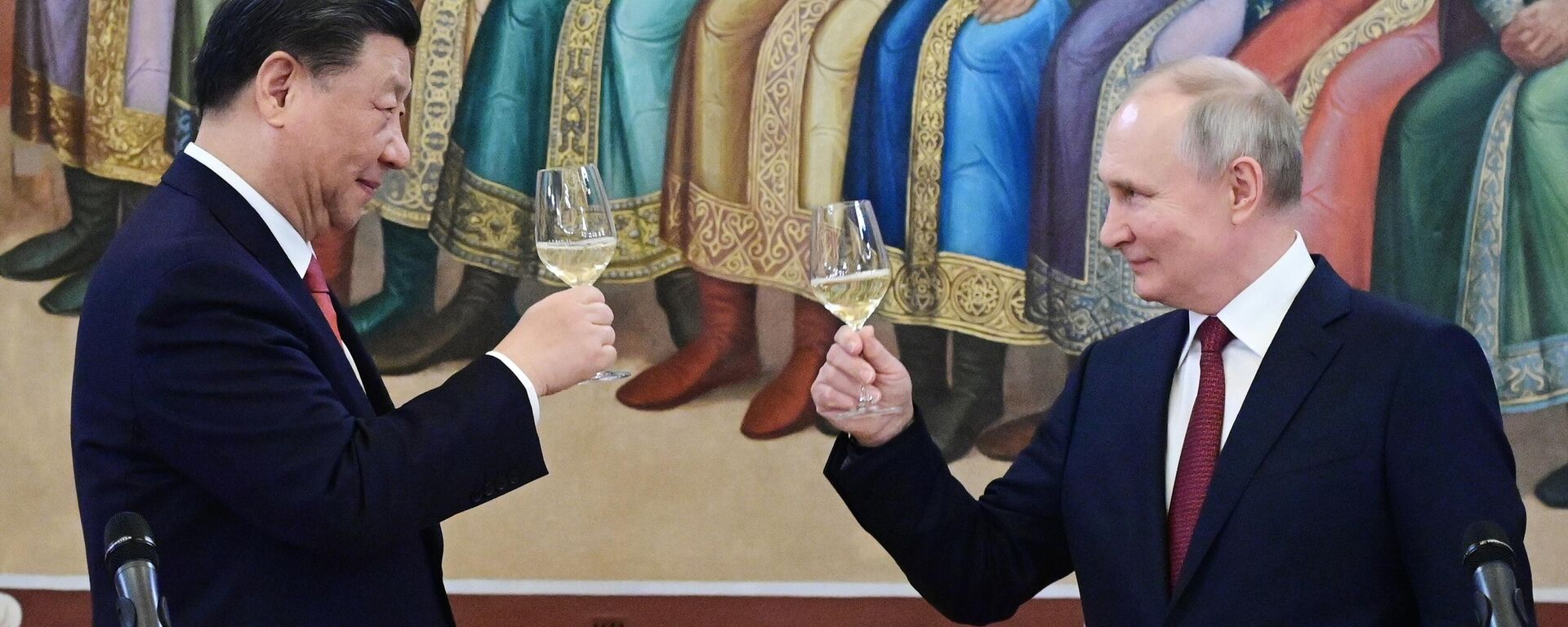https://sputnikglobe.com/20230527/henry-kissinger-turns-100-from-clandestine-ops-mastermind-to-political-realist-1110637902.html
Henry Kissinger Turns 100: From Clandestine Ops Mastermind to Political Realist
Henry Kissinger Turns 100: From Clandestine Ops Mastermind to Political Realist
Sputnik International
Henry Kissinger, a veteran strategist known for propelling a US-Soviet détente in the 1980s and laying the groundwork for ending the Cold War, turned 100 on May 27. Who is Kissinger and what's his legacy?
2023-05-27T14:27+0000
2023-05-27T14:27+0000
2023-05-27T14:27+0000
analysis
henry kissinger
mikhail gorbachev
ukraine
china
russia
nato
vietnam war
berlin wall
ussr
https://cdn1.img.sputnikglobe.com/img/18441/97/184419719_0:0:2873:1617_1920x0_80_0_0_c6ac445a31f0407b183827889b274ef5.jpg
Henry Kissinger is an American political scientist and former US secretary of state. He is famous for creating the foreign-policy doctrine called "realism". No matter how the geopolitical situation changes, Kissinger continues to insist that Russia should be perceived as "an essential element" of global equilibrium and call for a peaceful co-existence with China.Every time he outlines his political vision, Kissinger had America's interests at heart, according to Nicolai Petro, professor of political science at the University of Rhode Island specializing in Ukraine and Russia.Who is Kissinger?Henry Kissinger was born in Germany in 1923 to a Jewish family. After Nazis grabbed power in the country, the Kissingers emigrated to the United States, fleeing the Hitler regime's anti-Semitic policies, and settled in New York. During the Second World War, Henry Kissinger served in the US Army as a German interpreter.After the war, the would-be strategist assumed a position in the Army Counter Intelligence Corps in occupied West Germany. As per Pulitzer Prize-winning journalist Seymour Hersh, Kissinger was assigned to a unit whose functions in particular included the recruitment of former Nazi intelligence officers. The US used them for anti-Soviet operations inside the Soviet bloc.In 1968, then-President-elect Richard Nixon tapped Kissinger for the position of his National Security Adviser. As a result, from 1969 to 1976 Kissinger played a visible role in shaping US foreign policy under Presidents Nixon and Gerald Ford. He continued to work in the capacity of a foreign policy consultant to the US government in subsequent years. He still remains a political heavyweight, whose advice American leaders lend a sympathetic ear to.Kissinger critics call him a "warmonger" for his role in ousting Chilean President Salvador Allende in 1973, a "green light" to the Argentinian junta's brutal purge of left-wingers, controversial policies during the Vietnam War (ranging from escalating the conflict to trying to end it), the US bombing of Cambodia civilians during the Vietnam War, and pitting China against the USSR.At the same time, it was Kissinger who facilitated the resumption of relations with the People's Republic of China and pioneered the policy of détente with the USSR, which eventually led to the end of the Cold War.US-Soviet Détente and Collapse of USSRThe main issue of the US-Soviet détente was arms limitation treaties between the two nuclear powers. The Strategic Arms Limitation Talks (SALT) aimed at restraining the arms race in long-range or intercontinental ballistic missiles armed with nuclear weapons began in 1969. SALT I and SALT II were signed by the US and the USSR in 1972 and 1979, respectively, with Kissinger playing a substantial role in propelling the strategy from the US side.In the 1980s US President Ronald Reagan appointed Kissinger to serve on his Foreign Intelligence Advisory Board and the Commission on Integrated Long-Term Strategy. In 1987, Reagan and Soviet leader Mikhail Gorbachev struck the Intermediate-Range Nuclear Forces Treaty (INF) paving the way for decades of animosity. The fall of the Berlin Wall in November 1989 became a clear manifestation of the end of the Cold War.In January 1989, ten years after the signing of SALT II, Henry Kissinger and his fellows travelled to the USSR to meet with Gorbachev as part of the US Trilateral Commission's initiative.The group and Gorbachev discussed the issue of coexistence between the two powers as well as a roadmap of the USSR's integration into the world economy, the search for forms of cooperation between the countries and the creation of legal and economic bases for future collaboration.However, in 1991 the Soviet Union ceased to exist, shredding the Gorbachev-Kissinger plans, and opening the door to the US unipolar moment accompanied with NATO's eastward expansion, Washington's overseas wars and regime change operations."The post-Cold War cycle of destruction began with the false hope that imposing American hegemony could create global peace. This led to ignoring the conventional balance, in pursuit of a national interest misconstrued as the interests of all mankind," Petro said.Kissinger's Vision of Relations With Russia, ChinaThe past three decades the US-Russian relations have proven to be bumpy and controversial, eventually leading to an ongoing proxy war in Ukraine led by the US and its NATO allies. It appears that decades of Kissinger's détente efforts have been thrown down the drain by the incumbent Biden administration and its predecessors.Kissinger believes that the Russo-Ukrainian conflict was largely prompted by Washington's plan to drive Ukraine in its NATO fold. "I thought that the decision to…leave open the membership of Ukraine in NATO was very wrong," the veteran diplomat told the Economist earlier this month.At the same time, however, he is now advocating Ukraine's NATO membership. According to him, Ukraine both needs to be protected and restrained. "If I talked to Putin, I would tell him that he, too, is safer with Ukraine in NATO," he said in his recent interview. "We have now armed Ukraine to a point where it will be the best-armed country and with the least strategically experienced leadership in Europe."The old diplomat also hailed China's peace solution for Ukraine and warned the Biden administration against provoking a conflict with the People's Republic. According to him, a peaceful coexistence and collaboration between Washington and Beijing is possible. On the other hand, the architect of the Sino-Soviet split insisted that Russia and China can't work together well.Judging from Petro's notion that no there is no diplomacy disconnected from the pursuit of power, one might assume that Kissinger's vision reflects what the best for the US is. Meanwhile, Russia and China have been implementing their own vision, outlined in their recent national and global security doctrines.
https://sputnikglobe.com/20220720/henry-kissinger-father-of-us-china-dtente-warns-biden-against-endless-confrontations-with-prc-1097627719.html
https://sputnikglobe.com/20220612/henry-kissinger-says-us-infinitely-more-polarized-today-than-during-vietnam-war-1096237196.html
https://sputnikglobe.com/20150817/ussr-could-avoid-dissolution-1025837938.html
https://sputnikglobe.com/20210530/how-story-of-broken-nato-non-enlargement-pledge-upends-wests-effort-to-depict-russia-as-aggressor-1083035472.html
https://sputnikglobe.com/20220701/kissinger-breaks-down-3-possible-outcomes-of-ukraine-crisis-1096858078.html
https://sputnikglobe.com/20230504/pepe-escobar-us-outmatched-by-russia-china-1110095098.html
ukraine
china
russia
ussr
cambodia
Sputnik International
feedback@sputniknews.com
+74956456601
MIA „Rossiya Segodnya“
2023
News
en_EN
Sputnik International
feedback@sputniknews.com
+74956456601
MIA „Rossiya Segodnya“
Sputnik International
feedback@sputniknews.com
+74956456601
MIA „Rossiya Segodnya“
henry kissinger, richard nixon, cold war, sino-soviet split, vietnam war, henry kissinger 100 years, henry kissinger turns 100, kissinger political realism, kissinger globalism, kissinger trilateral comission, kissinger mikhail gorbachev, kissinger us-china relations, kissinger ukraine nato membership
henry kissinger, richard nixon, cold war, sino-soviet split, vietnam war, henry kissinger 100 years, henry kissinger turns 100, kissinger political realism, kissinger globalism, kissinger trilateral comission, kissinger mikhail gorbachev, kissinger us-china relations, kissinger ukraine nato membership
Henry Kissinger Turns 100: From Clandestine Ops Mastermind to Political Realist
The veteran strategist known for propelling a US-Soviet détente in the 1980s and laying the groundwork for ending the Cold War turned 100 on May 27. Who is Kissinger and what's his legacy?
Henry Kissinger is an American political scientist and former US secretary of state. He is famous for creating the foreign-policy doctrine called "realism".
No matter how the geopolitical situation changes, Kissinger continues to insist that Russia should be perceived as "an essential element" of global equilibrium and call for a peaceful co-existence with China.
Every time he outlines his political vision, Kissinger had America's interests at heart, according to Nicolai Petro, professor of political science at the University of Rhode Island specializing in Ukraine and Russia.
"Most people don’t understand that there is no 'independent diplomacy' pursued for the benefit of all humanity and disconnected from the pursuits of power," Petro told Sputnik. "For the Father of Realism, Hans Morgenthau, 'Politics is a struggle for power over men and whatever its ultimate aim may be, power is its immediate goal'. Kissinger understood this better than most. His latest book 'Leadership: Six Studies in World Strategy', is a paean to six statesmen who devoted their lives to the achievement of advantages for their national governments. For a classical Realist like Kissinger, this is the pinnacle of diplomatic success."
Henry Kissinger was born in Germany in 1923 to a Jewish family. After Nazis grabbed power in the country, the Kissingers emigrated to the United States, fleeing the Hitler regime's anti-Semitic policies, and settled in New York. During the Second World War, Henry Kissinger served in the US Army as a German interpreter.
After the war, the would-be strategist assumed a position in the Army Counter Intelligence Corps in occupied West Germany. As per Pulitzer Prize-winning journalist Seymour Hersh, Kissinger was assigned to a unit whose functions in particular included the recruitment of former Nazi intelligence officers. The US used them for anti-Soviet operations inside the Soviet bloc.
In the 1950s, Kissinger served as a consultant to several government agencies including the Department of Defense's Operations Research Office, while in 1952, he was appointed as an aide to the director of the Psychological Strategy Board, specializing in covert psychological and paramilitary operations. At that time, Kissinger was also said to be close to Nelson Rockefeller, an architect of the US-Iran policy and special assistant to President Dwight Eisenhower in charge of Cold War planning.
In 1968, then-President-elect Richard Nixon tapped Kissinger for the position of his National Security Adviser. As a result, from 1969 to 1976 Kissinger played a visible role in shaping US foreign policy under Presidents Nixon and Gerald Ford. He continued to work in the capacity of a foreign policy consultant to the US government in subsequent years. He still remains a political heavyweight, whose advice American leaders lend a sympathetic ear to.
Kissinger critics call him a
"warmonger" for his role in ousting
Chilean President Salvador Allende in 1973, a "green light" to the Argentinian junta's brutal purge of left-wingers, controversial policies during the
Vietnam War (ranging from escalating the conflict to trying to end it), the US bombing of Cambodia civilians during the Vietnam War, and pitting China against the USSR.
At the same time, it was Kissinger who facilitated the resumption of relations with the People's Republic of China and pioneered the policy of détente with the USSR, which eventually led to the end of the Cold War.
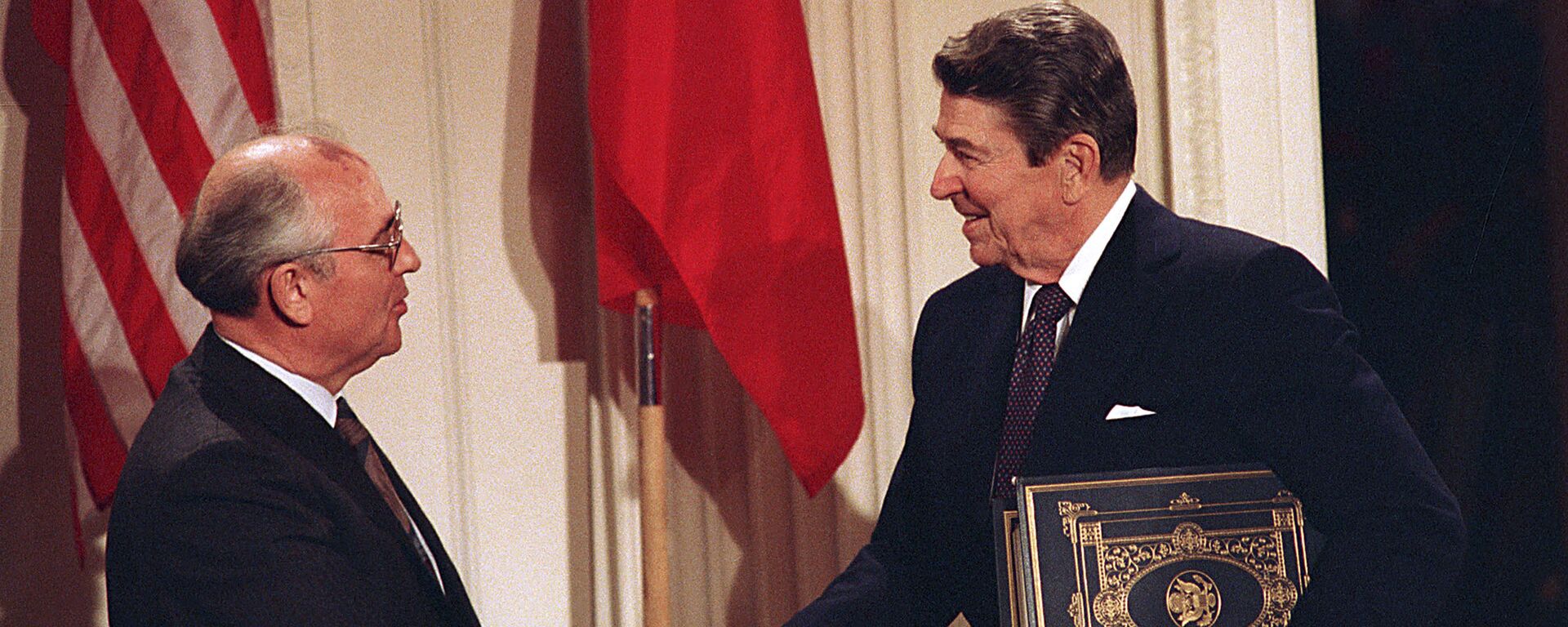
17 August 2015, 13:47 GMT
US-Soviet Détente and Collapse of USSR
The main issue of the US-Soviet détente was arms limitation treaties between the two nuclear powers. The Strategic Arms Limitation Talks (SALT) aimed at restraining the arms race in long-range or intercontinental ballistic missiles armed with nuclear weapons began in 1969. SALT I and SALT II were signed by the US and the USSR in 1972 and 1979, respectively, with Kissinger playing a substantial role in propelling the strategy from the US side.
In the 1980s US President Ronald Reagan appointed Kissinger to serve on his Foreign Intelligence Advisory Board and the Commission on Integrated Long-Term Strategy. In 1987, Reagan and Soviet leader Mikhail Gorbachev struck the Intermediate-Range Nuclear Forces Treaty (INF) paving the way for decades of animosity. The fall of the Berlin Wall in November 1989 became a clear manifestation of the end of the Cold War.
In January 1989, ten years after the signing of SALT II, Henry Kissinger and his fellows travelled to the USSR to meet with Gorbachev as part of the US Trilateral Commission's initiative.
The group and Gorbachev discussed the issue of coexistence between the two powers as well as a roadmap of the USSR's integration into the world economy, the search for forms of cooperation between the countries and the creation of legal and economic bases for future collaboration.
However, in 1991 the Soviet Union ceased to exist, shredding the Gorbachev-Kissinger plans, and opening the door to the US unipolar moment accompanied with NATO's eastward expansion, Washington's overseas wars and regime change operations.
"The post-Cold War cycle of destruction began with the false hope that imposing American hegemony could create global peace. This led to ignoring the conventional balance, in pursuit of a national interest misconstrued as the interests of all mankind," Petro said.
"The pursuit of balance, and the rejection of hegemony are thus the key to the success of foreign policy, say Realists, because the application of power alone will only lead to escalation. Realism assumes the world is full of contradictions that will never be resolved, and statesmen should recognize that there is no escape from the evil that inevitably results from trying to do good through coercion (…) A return to Kissingerian Realism would therefore be a step in the right direction, restoring mutual respect for each other’s interests," he pointed out.
Kissinger's Vision of Relations With Russia, China
The past three decades the US-Russian relations have proven to be bumpy and controversial, eventually leading to an ongoing
proxy war in Ukraine led by the US and its NATO allies. It appears that decades of Kissinger's détente efforts have been thrown down the drain by the incumbent Biden administration and its predecessors.
"Had the United States sought balance rather than hegemony in Europe through the expansion of NATO, Russia would have most likely accepted the status quo. Now, say classical realists, the United States is making exactly the same mistake again with China," the professor explained.
Kissinger believes that the Russo-Ukrainian conflict was largely prompted by Washington's plan to drive Ukraine in its NATO fold. "I thought that the decision to…leave open the membership of Ukraine in NATO was very wrong," the veteran diplomat told the Economist earlier this month.
At the same time, however, he is now advocating Ukraine's NATO membership. According to him, Ukraine both needs to be protected and restrained. "If I talked to Putin, I would tell him that he, too, is safer with Ukraine in NATO," he said in his recent interview. "We have now armed Ukraine to a point where it will be the best-armed country and with the least strategically experienced leadership in Europe."
The old diplomat also hailed China's peace solution for Ukraine and warned the Biden administration against provoking a conflict with the People's Republic. According to him, a peaceful coexistence and collaboration between Washington and Beijing is possible. On the other hand, the architect of the Sino-Soviet split insisted that
Russia and China can't work together well.
Judging from Petro's notion that no there is no diplomacy disconnected from the pursuit of power, one might assume that Kissinger's vision reflects what the best for the US is. Meanwhile, Russia and China have been
implementing their own vision, outlined in their recent national and global security doctrines.
